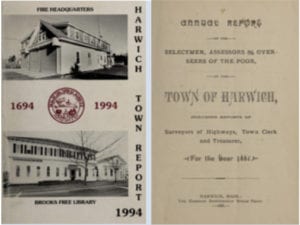Who is a member?
Our members are the local governments of Massachusetts and their elected and appointed leadership.

Harwich town reports from 1994 and 1887
With assistance from the Boston Public Library, the town of Harwich has digitized its entire collection of town reports, dating back more than a century and a half.
The reports have been scanned and indexed, and are available – and completely searchable – online.
The collection reflects years of Harwich’s history, from the “ruinous” effect of World War I on the prices of cranberries to the school system’s evaluation of drawing, which was a new program in 1900.
“People don’t realize the things that are in there,” said Jennifer Pickett, a reference librarian in Harwich’s public library. “It’s great for dates, to figure out when something happened, who worked where.”
Genealogical data, often included in the official birth and death records, is also a part of town reports’ lasting importance to a community, she said. Many of Harwich’s town reports list the names of all newborns, and some even contain all marriage applications in a given year, making them popular among those attempting to trace their family history.
“So many people would come in and be at the library repeatedly, day after day,” Pickett said. “They would camp out at a table, and I’d give them a box [of town reports] at a time. They would spend all day looking. And now they can do it online.”
In addition to helping library patrons find information, the digitization effort represents the town’s interest in preserving its history.
“Here in Harwich, we don’t have a lot of really great history books – people aren’t writing a lot of local history these days – so [the digitization effort] really substitutes for that,” Pickett said.
Since 2011, the Boston Public Library’s Statewide Digitization Project has been offering free services to all types of “historical institutions” – including towns, libraries and historical societies – that, like Harwich, are looking for a way to preserve their history.
“As long as you’re willing to have your materials represented [publicly] online, then we’ll digitize it for you, and we’ll help you with the cataloging and metadata work,” said Jake Sadow, an archivist with the project.
For the organizations that it helps, the Digitization Project delivers a fully indexed online archive, hosted through the Boston Public Library’s servers.
As for the significance of submitting town reports for digitization, Sadow said, “Within [each] town, they represent a really rich piece of history. And at a broader level, it’s an advantage to have digitized so many [across the state]. … You can start to track how towns responded to a particular historical event, [how they] responded to the Great Depression or World War II or whatever major event was going on at the time.”
Harwich’s 1943 town report, for example, details the Harwich Company of the Massachusetts State Guard’s involvement in “two emergency missions:–two occasions of saboteur scares–a night of duty stopping and searching all cars on the Cape. … And in conjunction with the Army, a systematic search of the terrain of Wellfleet, Turo, and Provincetown by the Regiment.”
Harwich’s full collection of reports is available at https://archive.org/details/brooksfreelibrary.
To apply for free digitization of town reports or other documents through the Statewide Digitization Project, visit http://bit.ly/dcbplform.
Written by Elisa Sturkie, Communications Intern